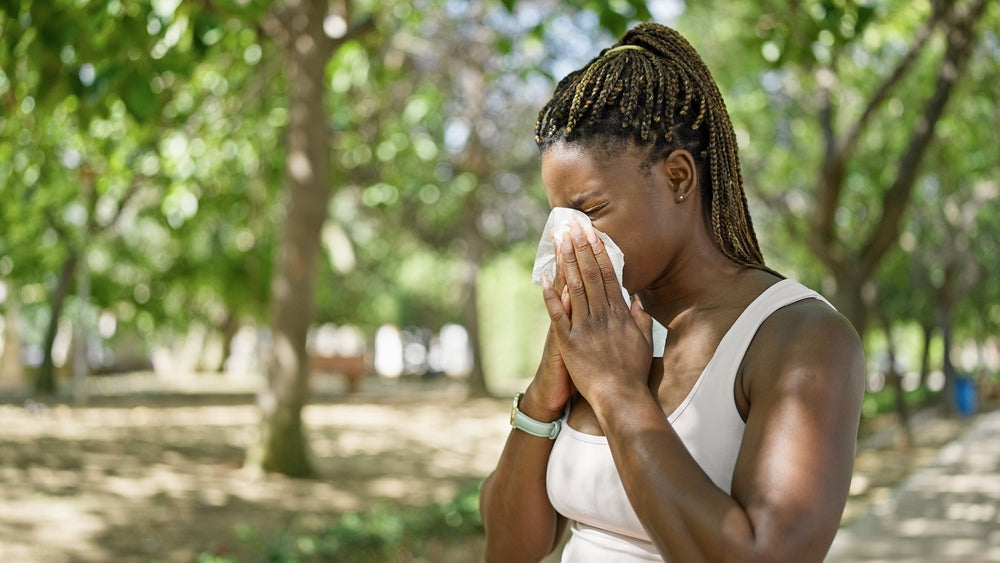Free U.S. Shipping On Orders Over $150

How to Safely Exercise Outside If You Have Seasonal Allergies
Posted on
Allergy season, which stretches from spring all the way to fall, is bad enough for allergy sufferers without having to go outside. Many people already struggle to keep pollen and other allergens from getting inside the house. Going outside, where it is in plenty, is bound to cause a host of health problems.
This is a problem if you like to exercise outside. Going on a run or walk can leave you with a stuffy nose, itchy eyes, or even an asthma attack if you are asthmatic.
Does that mean you give up on outdoor exercise? Heck no. Here are some tips to enjoy exercise outdoors if you have seasonal allergies.
Note: If you have very severe allergies, ask your doctor for advice. They may recommend avoiding any kind of outdoor exercise for your safety.
Pick the Best Time for Low Pollen Counts
Pollen is the biggest enemy for people with seasonal allergies. In spring, summer and fall, trees, grasses, weeds and flowers release pollen into the air. But the amount of pollen (pollen count) varies throughout the day.
In most places, pollen levels start rising in the morning and peak in the afternoon. So pollen count is lowest during early dawn and late afternoon or evening. Those are the best times to exercise outside.
But the amount of pollen at any time varies depending on the type of pollen. For instance, researchers have found that the level of ragweed pollen, which begins spreading in mid-august, can remain high throughout the day and even at night.
The best way to decide when to go outdoors is to check your local pollen counts. There are lots of websites, apps and weather forecasts that provide that information. Pick a time when the count is lowest.
Tip: Remember to take off your clothes and put them away before you do anything. This ensures you don't introduce pollen in your house.
Monitor Weather Conditions
Pollen count is highest when the weather is dry, warm and windy. Pollen, dust, mold spores and other allergens easily rise into the air and spread far and wide.
So as you check the pollen count, check the weather forecast as well. Watch the humidity level in particular. Dry air not only increases the amount of airborne allergens, it also makes you more sensitive to them by reducing protective mucus in your nose.
If the humidity is too low (under 30%), avoid going outside or carry a saline spray to reduce allergy symptoms and make it easier to breathe. If it’s windy, we recommend avoiding going outside until it’s calmer.
Tip: Low humidity inside can also trigger allergies and cause discomfort as we explained in a previous post on dry air and sleep. Getting a humidifier, even if it's a small bedside unit, will help you sleep a lot better.
Wear a Comfortable Face Mask When Outdoors
No matter the pollen count, it’s a good idea to mask up whenever you go outside if you have allergies. That’s because the pollen level could still be high enough to affect you and there may be other allergens in the air as well.
It’s important to choose a comfortable mask. The wrong mask can make breathing harder or leave your skin raw and irritated.
Choose a soft and smooth mask like the Hercleon Aplu mask. You can wear it for hours outdoors without any discomfort.
Consider Indoor Exercise Alternatives
It’s smart to know when to let the pollen win. If the pollen count is too high, the weather is dry and windy or your allergies are worse than usual, consider indoor exercise instead. This can be a treadmill at home or going to the gym.
You can then go outside when things get better.
Opt for Different Types of Workouts
The type of workout can also determine how bad your allergies get. Many people who have bad allergies have reported feeling better when they switched from running, walking or cycling to swimming.
That’s likely because you breathe in fewer allergens when in water. Other water activities like kayaking are also usually safer for people with allergies.
Select Your Workout Location Wisely
Be careful where you workout. Avoid heavily wooded areas or places with lots of flowers or grass. These areas will have higher pollen counts throughout the day.
Use Allergy Medication
Taking allergy medication such as antihistamines can reduce symptoms of allergy exposure, making it easier for you to spend time outdoors. Talk to your doctor for advice on the best prescription depending on what kind of allergy symptoms you experience and how severe they get.
For people with severe allergies, ask your doctor about allergy shots. These are administered once or twice a week, and they are really effective at reducing allergy symptoms. The problem is that they can take months or years for their benefits to fully set in. So you have to be patient and stick with the treatment.
Quick links
Contact
6063 Hudson Road #160
Woodbury, MN 55125
Yo@hercLeon.com
Leave a comment: